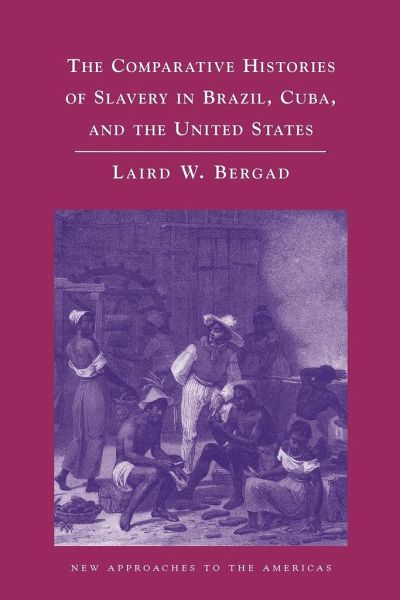
The Comparative Histories of Slavery in Brazil, Cuba, and the United States
Versandkostenfrei!
Versandfertig in 1-2 Wochen
36,99 €
inkl. MwSt.

PAYBACK Punkte
18 °P sammeln!
This book is an introductory history of racial slavery in the Americas.This book is an introductory history of racial slavery in the Americas. Brazil and Cuba were among the first colonial societies to establish slavery in the early sixteenth century. Approximately a century later British colonial Virginia was founded, and slavery became an integral part of local culture and society. In all three nations, slavery spread to nearly every region, and in many areas it was the principal labor system utilized by rural and urban elites. Yet long after it had been abolished elsewhere in the Americas, ...
This book is an introductory history of racial slavery in the Americas.
This book is an introductory history of racial slavery in the Americas. Brazil and Cuba were among the first colonial societies to establish slavery in the early sixteenth century. Approximately a century later British colonial Virginia was founded, and slavery became an integral part of local culture and society. In all three nations, slavery spread to nearly every region, and in many areas it was the principal labor system utilized by rural and urban elites. Yet long after it had been abolished elsewhere in the Americas, slavery stubbornly persisted in the three nations. It took a destructive Civil War in the United States to bring an end to racial slavery in the southern states in 1865. In 1866 slavery was officially ended in Cuba, and in 1888 Brazil finally abolished this dreadful institution, and legalized slavery in the Americas came to an end.
Table of contents:
Introduction; 1. From colonization to abolition: patterns of historical development in Brazil, Cuba, and the United States; 2. The diversity of slavery in the Americas to 1790; 3. Slaves in their own words; 4. Slave populations; 5. Economic aspects; 6. Making space; 7. Resistance and rebellions; 8. Abolition; Bibliography.
This book is an introductory history of racial slavery in the Americas. Brazil and Cuba were among the first colonial societies to establish slavery in the early sixteenth century. Approximately a century later British colonial Virginia was founded, and slavery became an integral part of local culture and society. In all three nations, slavery spread to nearly every region, and in many areas it was the principal labor system utilized by rural and urban elites. Yet long after it had been abolished elsewhere in the Americas, slavery stubbornly persisted in the three nations. It took a destructive Civil War in the United States to bring an end to racial slavery in the southern states in 1865. In 1866 slavery was officially ended in Cuba, and in 1888 Brazil finally abolished this dreadful institution, and legalized slavery in the Americas came to an end.
Table of contents:
Introduction; 1. From colonization to abolition: patterns of historical development in Brazil, Cuba, and the United States; 2. The diversity of slavery in the Americas to 1790; 3. Slaves in their own words; 4. Slave populations; 5. Economic aspects; 6. Making space; 7. Resistance and rebellions; 8. Abolition; Bibliography.




